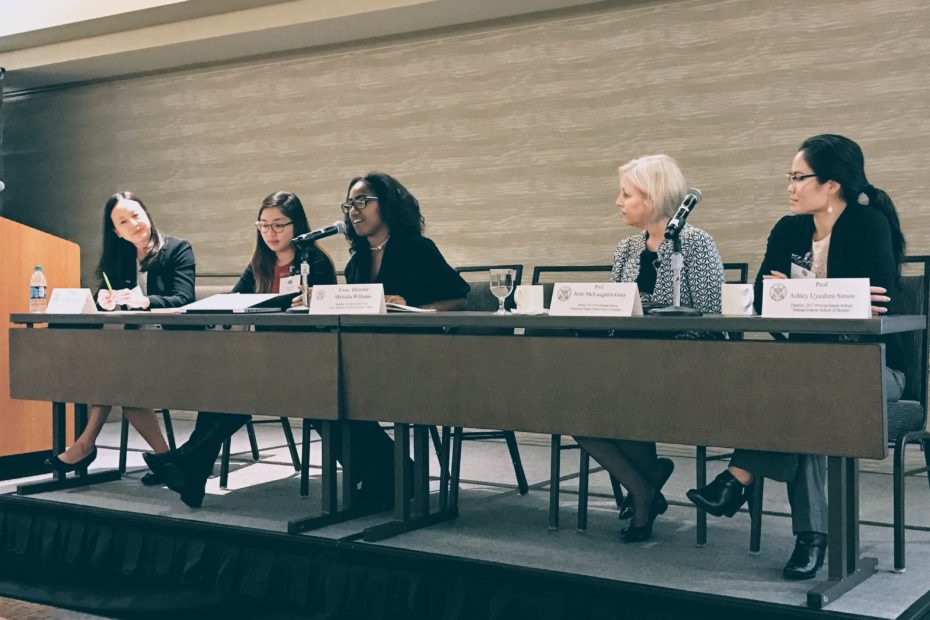On February 17-18, 2017, the Joint Provost/Academic Senate Retreat that focused on “Making Progress on Climate, Safety and Wellness.” This is part 2 of the 3 part summary of the sessions.
Session 2: First-Year Student Learning and Wellness
Chair: Tracy Poon Tambascia from the Rossier School of Education
Tracy Poon Tambascia provided an introduction to first-year (FY) initiatives that many campuses now offer, and which aim to increase student retention, improve student satisfaction and engagement, and foster wellness and identity development. FY courses range from optional course offerings for one unit, to living-learning communities that include co-enrollment in academic classes and living in the same residence hall as classmates. Such initiatives aim to increase student-student and student-faculty interaction, overall student involvement, and to create links between curricular and co-curricular activities.
Tim Brunold, Dean of Admissions, discussed USC Undergraduate Orientation Programs, which are intended to “on board” students. Orientation has very high participation rates, with 99% of incoming students attending a session over the summer. Students receive information about the curriculum, acclimating to a new community, involvement activities, and procedural information such as how to register for classes.
Lynette Merriman, Assistant Vice Provost for Student Affairs, Student Support and Advocacy, discussed some of the challenges & problems faced by first-year students. They include the cultural adjustment involved in being in college and a new environment, including social, socio-economic and academic changes. The idea that “everyone is the best here” leads to insecurity and feelings of competition for some new students. Additional challenges her office sees include lack of resiliency — students can be “easily rattled”. Students may excel at academics but find other areas more challenging; mental health, with the most common disorders being anxiety and stress disorders; and alcohol and substance abuse, which can lead to sexual abuse issues too.
Student panelists Ivana Giang and Mykaila Williams discussed sense of belonging for USC students, and how some students from diverse backgrounds do not feel supported on campus. The students raised concerns regarding self-care, with students failing to take care of themselves because they get overwhelmed with homework and the need to get good grades. They spoke at length about the importance of diversity & inclusion and how some students, especially racial minorities, never “feel included.” In particular, the students noted that they would like to see more happening during Orientation regarding diversity & inclusion, and they discussed the importance of communicating USC’s commitment to being inclusive.
Ashley Uyeshiro Simon & Julie McLaughlin Gray from the USC Chan Division of Occupational Science and Occupational Therapy program discussed a proposed Freshman Self-Care course that they are developing, which is focused on the everyday activities & needs of “emerging adults.” The pilot class will be one unit for 1.5 hours each week over 15 weeks. It will be a pass/no pass class using short lectures to start the class, and then using mostly active-learning techniques. The syllabus will have a few weeks about basic wellness, followed by topics relating to mental and emotional health, and then have a few weeks on broader social issues.
Ashley and Julie have conducted an informal survey of students concerning desired course content & format and found a big interest among their students. OT already offers individual self-care counseling program for students called “lifestyle redesign,” which works with their daily habits and routines. This idea originated in their discipline for aging people but the core principles can be applied to students to work on their eating habits, physical activity goals, wellness, managing their budgets, socialization gains, and study skills. The most common problems are excessive stress, anxiety, along with ADD/ADHD. OT has had good results with individual counseling for their students to reduce stress and improve socialization.
To discuss go to our Facebook post.

Tracy Poon Tambascia
Associate Professor of Clinical Education
Rossier School of Education

